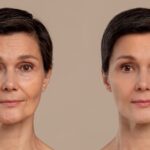Introduction
As we age, our skin loses its elasticity, and wrinkles, fine lines, and age spots start appearing. While aging is a natural process, we can still take steps to keep our skin looking healthy and youthful. Anti-aging skincare products for men have gained popularity in recent years. However, with so many options available, it can be overwhelming to know where to start. In this article, we’ll explore the science behind anti-aging skincare and provide some tips for men to help them take care of their skin.
Understanding the Aging Process of Skin
Before we dive into anti-aging skincare, it’s important to understand how our skin ages. Our skin has three layers: the epidermis, the dermis, and the subcutaneous layer. The epidermis is the outermost layer and contains dead skin cells that need to be exfoliated regularly. The dermis is the middle layer that contains collagen, elastin, and other proteins that keep our skin firm and elastic. The subcutaneous layer is the innermost layer that contains fat and connective tissue.
As we age, the production of collagen and elastin slows down, and our skin becomes less elastic, thinner, and drier. This makes wrinkles, fine lines, and age spots more prominent. Additionally, exposure to UV radiation, pollution, and other environmental factors can damage our skin and accelerate the aging process.
The Science Behind Anti-Aging Skincare
Anti-aging skincare products aim to address the signs of aging by targeting the root causes. Some of the key ingredients in anti-aging skincare products include:
- Retinoids: Retinoids are derivatives of vitamin A and are known for their ability to increase collagen production, reduce fine lines and wrinkles, and improve skin texture and tone. However, they can also cause irritation and sensitivity, so it’s important to start with a low concentration and gradually increase it over time.
- Antioxidants: Antioxidants help to neutralize free radicals, which are unstable molecules that can damage our skin cells and accelerate the aging process. Some common antioxidants used in skin care products include vitamins C and E, green tea, and resveratrol.
- Peptides: Peptides are short chains of amino acids that can stimulate collagen production and improve skin elasticity. They can also help to reduce inflammation and promote wound healing.
- Hyaluronic acid: Hyaluronic acid is a naturally occurring substance in our skin that helps to retain moisture and keep our skin hydrated. As we age, the production of hyaluronic acid decreases, leading to dryness and fine lines. Skincare products containing hyaluronic acid can help to restore moisture and plump up the skin.
- Sunscreen: Sunscreen is essential for protecting our skin from UV radiation, which is one of the main causes of skin aging. Look for a broad-spectrum sunscreen with an SPF of 30 or higher and apply it daily, even on cloudy days.
Tips for Men’s Anti-Aging Skincare Routine
Now that we’ve covered the science behind anti-aging skincare, let’s look at some tips for men to help them take care of their skin.
- Cleanse twice a day: Cleansing is an essential step in any skincare routine. Use a gentle cleanser to remove dirt, oil, and other impurities from your skin. Avoid using hot water or harsh soaps, as they can strip your skin of its natural oils.
- Exfoliate once or twice a week: Exfoliation helps to remove dead skin cells and unclog pores, leaving your skin looking brighter and smoother. However, be gentle when exfoliating and avoid over-exfoliating, as it can cause irritation and dryness.
- Use a serum: Serums are lightweight formulations that contain high concentrations of active ingredients. They can penetrate deeply into the skin and provide targeted benefits. Look for a serum that contains retinoids, antioxidants, or peptides to help improve the appearance of fine lines, wrinkles, and other signs of aging.
- Moisturize daily: Moisturizing is important for keeping your skin hydrated and preventing dryness, which can make wrinkles and fine lines more visible. Look for a moisturizer that contains hyaluronic acid, glycerin, or other humectants that can help to attract and retain moisture in your skin.
- Protect your skin from the sun: As we mentioned earlier, UV radiation is one of the main causes of skin aging. Make sure to apply sunscreen with an SPF of 30 or higher every day, even on cloudy days. Wear protective clothing, such as hats and long-sleeved shirts, and avoid prolonged exposure to the sun.
- Get enough sleep: Lack of sleep can lead to dark circles, puffiness, and other signs of aging. Aim for 7-8 hours of sleep every night to help your skin repair and regenerate.
- Stay hydrated: Drinking plenty of water can help to keep your skin looking healthy and hydrated. Aim for at least 8 glasses of water a day, and limit your consumption of alcohol and caffeine, as they can dehydrate your skin.
- Eat a healthy diet: Eating a diet rich in fruits, vegetables, whole grains, and lean proteins can provide your skin with the nutrients it needs to stay healthy and youthful. Some particularly beneficial foods for skin health include berries, leafy greens, salmon, and nuts.
Conclusion
Taking care of your skin is an important part of maintaining your overall health and well-being. Anti-aging skincare products for men can help to address the signs of aging and keep your skin looking healthy and youthful. By understanding the science behind anti-aging skincare and following a regular skincare routine, you can take steps to protect your skin and keep it looking its best. Remember to cleanse, exfoliate, use a serum, moisturize, protect your skin from the sun, get enough sleep, stay hydrated, and eat a healthy diet. Your skin will thank you for it!
FAQ’s
Q. When should I start using anti-aging skincare products?
A. There’s no set age when you should start using anti-aging skincare products, as everyone’s skin ages differently. However, most experts recommend starting in your mid-20s to early 30s, as this is when your skin begins to lose collagen and elastin. Starting early can help to prevent and minimize the signs of aging.
Q. Does men’s skin require different anti-aging products than women’s?
A. Men’s skin tends to be thicker and oilier than women’s, which means that men may require different types of anti-aging products. However, many skincare products are formulated to be gender-neutral and can be used by both men and women. It’s important to choose products that are appropriate for your skin type and concerns.
Q. How often should I exfoliate my skin?
A. Exfoliating too often can irritate and damage your skin, so it’s important to find the right balance. Most experts recommend exfoliating 1-2 times per week, depending on your skin type and the type of exfoliator you’re using. If you have sensitive skin, you may want to exfoliate less frequently. Learn more about the importance of exfoliation and how to do it right from here.
Q. What’s the difference between a moisturizer and a serum?
A. Moisturizers and serums are both important parts of a skincare routine, but they serve different purposes. Moisturizers are designed to hydrate and protect the skin’s barrier, while serums contain high concentrations of active ingredients and are designed to target specific skin concerns, such as wrinkles or dark spots.
Q. Can I use anti-aging skincare products if I have sensitive skin?
A. Yes, you can still use anti-aging skincare products if you have sensitive skin, but you may need to be more careful about the ingredients you choose. Look for products that are labeled as gentle or formulated for sensitive skin, and patch test new products before using them all over your face.






